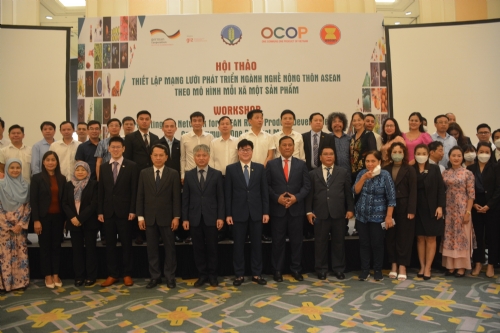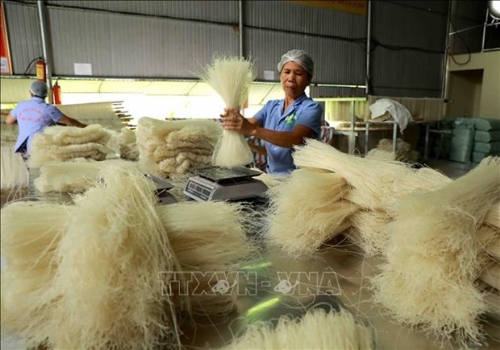Vietnam's 2019 economic growth expected to beat target
Tuesday, July 23, 2019 09:36

Vietnam’s economic growth is projected to reach 6.86% in 2019, exceeding the target of 6.6 – 6.8% set by the National Assembly, according to the National Center for Socio-Economic Information and Forecast (NCIF).
NCIF also predicted the consumer price index (CPI) to expand 3.13% in 2019, lower than the 4% target, while the ratio of state development expenditure to GDP and trade deficit would remain under close control.
Tran Thi Hong Minh, director of NCIF, attributed the projections to Vietnam’s positive economic performance in the first six months of 2019.
Vietnam’s GDP growth reached 6.71% in the second quarter, slightly down from the 6.82% rate recorded in the previous one. In the January – June period, Vietnam’s economy expanded 6.76%, lower than the rate of 7.05% in the same period last year, but higher than the average rate of the first six months in the 2011 – 2017 period.
However, Minh pointed out a number of challenges and bottlenecks restricting economic growth, such as the spread of African swine fever causing negative impacts on the agricultural sector; Vietnam’s agricultural exports facing fierce competition and trade protection measures, especially from the Chinese market.
Additionally, there have been signs of slowing down from the manufacturing sector, recording growth rate of 11.18% in the January – June period, lower than the 12.87% rate recorded in the same period of last year, mainly due to a decline in demand for electronic products in the global market.
Minh also expressed concern over the delay in the privatization and divestment processes in state-owned enterprises, while inflationary pressure remains a challenge due to potential rise of oil price in the world market and the expected price increase for essential goods and services in Vietnam, such as electricity, healthcare and education.
Nevertheless, Minh expected the Comprehensive and Progressive Trans – Pacific Partnership (CPTPP), which comes into force since early 2019, and the recently signed EU – Vietnam Free Trade Agreement (EVFTA) would boost Vietnam exports significantly.
The NCIF director noted due to the complex ratification process, the EVFTA is scheduled to become effective by the end of 2019.
According to Minh, both the CPTPP and the EVFTA would take time to make an impact on key macro-economic indicators, such as GDP growth.
In the meantime, Minh expected the government to continue focusing on improving the business environment and grasping opportunities from the global integration process, particularly from the shift of investment capital due to the ongoing US – China trade war.
The NCIF’s forecast on Vietnam’s GDP growth in 2019 is similar to that of the Central Institute for Economic Management (CIEM), which put the indicator at 6.82%.
The Vietnam Institute for Economic and Policy Research (VEPR) on July 11 released its forecast on Vietnam’s economy with GDP growth of 6.96%, coming on the back of strong GDP growth of over 7% in the remaining two quarters.
VEPR Director Nguyen Duc Thanh asserted the FDI sector remained a bright spot of the economy, playing a crucial role in export-led economic growth .
Minister of Planning and Investment Nguyen Chi Dung in his recent remark said Vietnam’s GDP growth remains on track to reach 6.78% in 2019, which is in line with the target of 6.6-6.8% set by the National Assembly.
Meanwhile, the World Bank in its latest “Managing Headwinds” report forecast Vietnam’s economic growth to moderate to 6.6% in 2019, driven by tightening and slower private consumption and weaker external demand.
Alex Mourmouras, division chief at International Monetary Fund (IMF), said in a statement that “a soft landing of growth is expected, to 6.5% in 2019 and over the medium term, reflecting weak external conditions. Inflation is expected to pick up slightly in 2019 on the back of administered price increases but should remain below the authorities’ 4%-target.”
Hai Yen
Other news
- HANOI: Promoting the consumption of craft village products and developing community tourism(11/5/2022 3:16:04 PM)
- Chuong My: Effectiveness from the One Commune One Product Program(11/3/2022 10:04:10 AM)
- Thanh Hoa develops OCOP products(11/1/2022 1:30:31 PM)
- Promoting the network for Asia Rural Product Development on one commune one product(8/30/2022 9:43:23 AM)
- Phu Tho eyes 56 new 3-star OCOP products for 2022(8/23/2022 3:09:56 PM)
- Opening of the OCOP product introduction week in Hanoi in 2022 in Phuc Tho district(8/1/2022 3:28:38 PM)
- Shipping route connecting central Vietnam, India inaugurated(7/29/2022 11:22:05 AM)
- Reference exchange rate down 4 VND on July 27(7/27/2022 11:42:14 AM)
- WB, Japan support greater access to legal services for the poor in Vietnam(7/27/2022 11:37:13 AM)
- Evaluation and classification of OCOP products Hoan Kiem District in 2022(7/27/2022 10:10:23 AM)
The featured news
-
HANOI: Promoting the consumption of craft village products and developing community tourism
-
Promoting the network for Asia Rural Product Development on one commune one product
-
Phu Tho eyes 56 new 3-star OCOP products for 2022
-
Opening of the OCOP product introduction week in Hanoi in 2022 in Phuc Tho district
-
Shipping route connecting central Vietnam, India inaugurated






